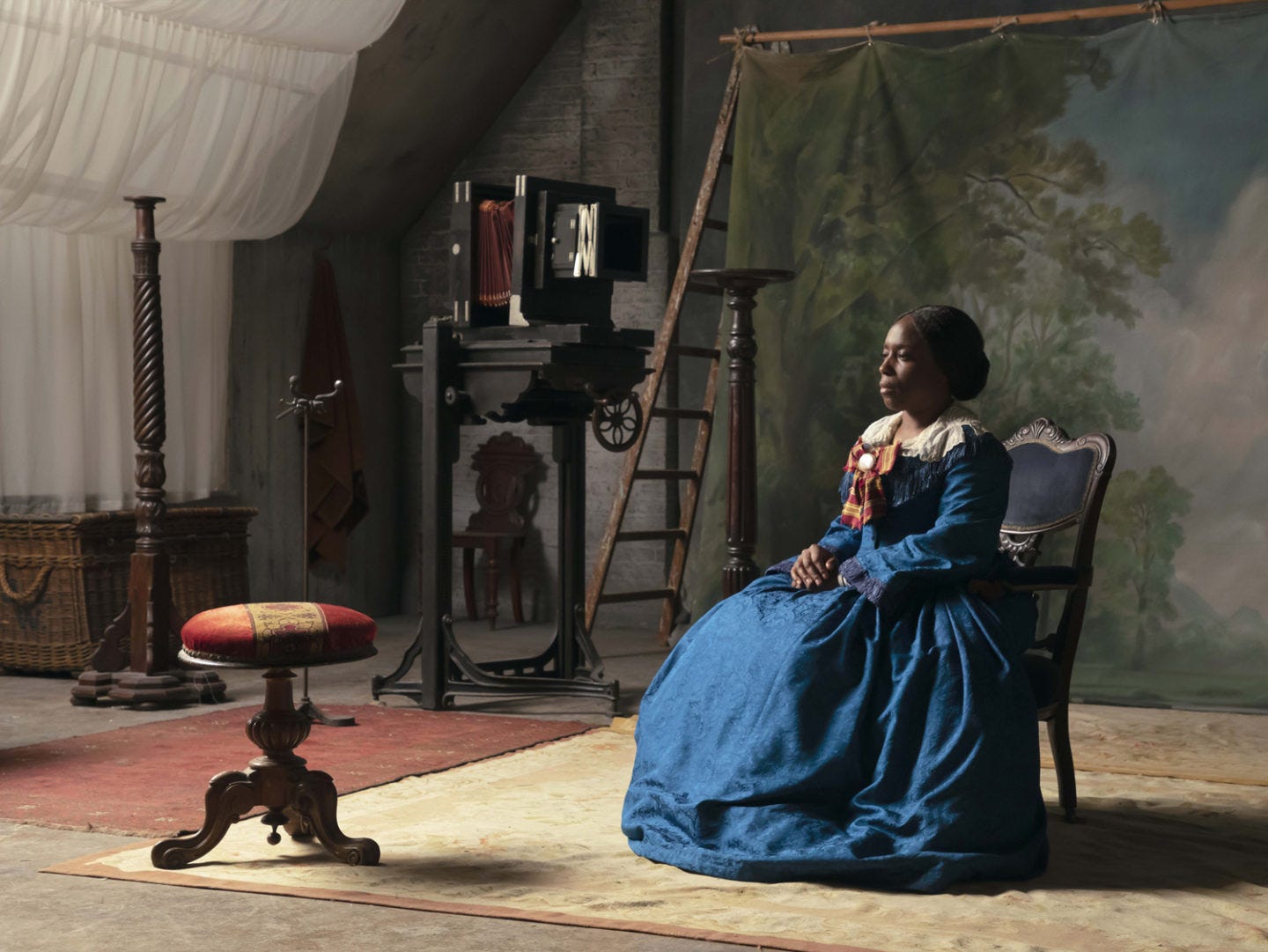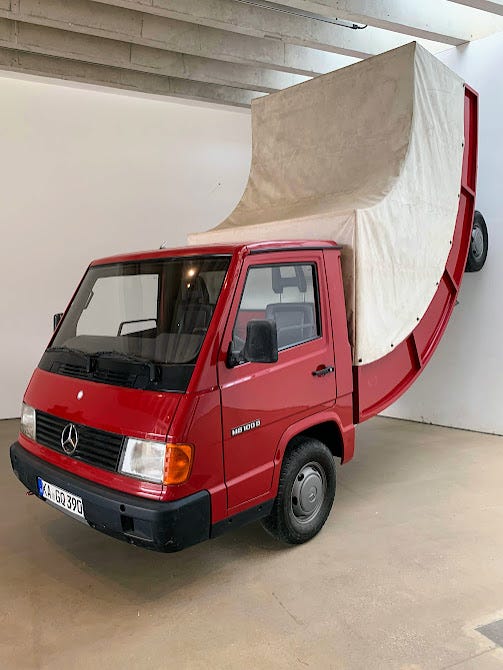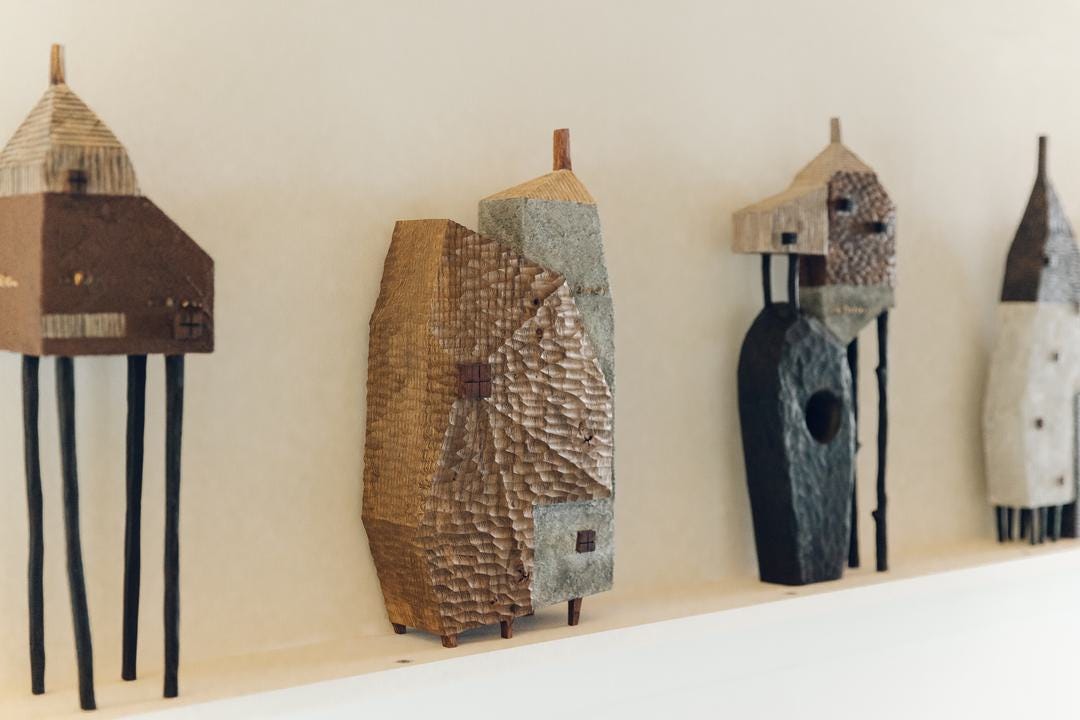Does the process know I'm trusting it?
On finding inspiration and hoping ideas take off
One of my favourite things about art college is a feeling. It comes when the ideas that I’ve been circling, the sketchbook experiments, gallery visits and middle-of-the-night brooding come together and suddenly there’s an upsurge. It’s like I’m a bird, and the wind has caught my outstretched wings and I’m soaring. There’s a whoosh of excitement and a sense that I’m being carried towards a mystery destination I might not be able to see, but that I somehow know will be there to welcome me.
Getting to the point of this lift off often doesn’t feel like a sky-bound joyride. It can be fun, but it can also be more of a stressed-out drive to the airport convinced you’ve forgotten something important. To throw caution to the wind, you first have to locate the caution, then track down the wind. I’m sure it was round here somewhere…
I’m very much in the car right now.
For the first time this academic year, my fellow kids and I are about to embark upon a self-directed project. There are no set parameters of materials to use, no techniques to stick to, no prompts or rules, other than making work by a certain date and writing a record of what we’ve done. It’s wildly exciting, having a month to make something, but fathoming what to do with this gift of time and space so it’s not spoiled or squandered (hello perfectionism) is also daunting. Apparently it’s time to trust the process.
***
During our Foundation course last year, my friend Caroline (this was her first time stone carving - can you believe how good it is? And here’s her most recent stone sculpture, which is incredible), was exasperated after the even-more-gnomic-than-usual pronouncements of one of our tutors. She declared that she was going to make a T-shirt that read “Trust the process”, something he told us constantly. (Although if there’s one group of people who love this phrase more than art teachers, it's therapists, so I suggested that she could market her merchandise to them, too.)
The internet LOVES trust-the-process content. There are countless essays, explainers, listicles and memes that explore the term. Does the process know we’re trusting it? Is the process in the room with us right now? Do the work. Trust the process. Embrace the uncertainty. It’s applied to creative endeavours, mental health, spiritual progression, management reshuffles and coaching (life, business and sport. In fact the latter seems to be where the phrase originated). As I understand it in relation to making art, trusting the process means not freaking out when I feel like I don’t have a clue what I’m doing, accepting that things will fall in place eventually, but knowing that I have to draw, think, read, make notes and gather resources. I need to look, listen and watch.
Not only do my metaphorical wings have to be out, I need to be outside and have a reasonable jumping-off point in order to catch the breeze that will help me fly. Inspiration can come at any time, and poking my phone while under a blanket on the sofa has its place, but I need to be proactive in seeking it, too. One of the learned-the-hard-way lessons of my old job was that a feature (aka an article, usually one with some feelings in it rather than straight-up news) that existed was always better than one that didn’t - one in the hand being worth two on the commissioned list. It’s the same with college work, or even just making work for oneself: it’s better to have done something rather than nothing. Paintings don’t paint themselves and even ready-made sculptures have to be thought of, found and presented.
Years ago, the artist Polly Morgan was asked by The Guardian, along with other creatives, about her tips for being inspired. I was pleased to see that number one on her list speaks to the just-do-something part of my process: “Don't wait for a good idea to come to you. Start by realising an average idea – no one has to see it. If I hadn't made the works I'm ashamed of, the ones I'm proud of wouldn't exist.” I’m also a fan of her insistence that “hard work isn't always productive. Your brain needs periods of inactivity. I think of it as a field lying fallow; keep harvesting and the crops won't mature.” See blanket, above. [On a side note, Polly is running the London Marathon for charity in memory of her late sister Emily. Donate here to support her.]
In the same Guardian story, Isaac Julien explained his all-you-can-eat approach: “I have a magpie attitude to inspiration: I seek it from all sorts of sources; anything that allows me to think about how culture comes together. I'm always on the lookout – I observe people in the street; I watch films, I read, I think about the conversations that I have. I consider the gestures people use, or the colours they're wearing. It's about taking all the little everyday things and observing them with a critical eye; building up a scrapbook which you can draw on.”
I’ve been magpieing about this week in the service of my process. My hungry little eye alighted on a faded book of quotations in the big old house where I’m staying. Between the “insect” and “instinct” pages was “inspiration”. I like the French film director Robert Bresson’s take. “When you do not know what you are doing and what you are doing is the best, that is inspiration”. I’m also amused by the fact that Jack London (author of the rufty-tufty adventure novels The Call of the Wild and White Fang) has a suitably macho line: “You cannot wait for inspiration. You have to go after it with a club.” Grrrrr!

There were more glittering spoils for me at the superlative Yorkshire Sculpture Park. There I caught up with the work of one of my heroes (Henry Moore) and met the creations of two new ones: Erwin Wurm and Yukihiro Akama. Wurm’s sculptures are glorious. Funny, thought-provoking, unexpected and in some cases, interactive. I loved them. And his sketches, which lined the walls of one of the inside gallery spaces. His take on materials is very cool, too: “At some point I came to realise that everything surrounding me can be material for an artistic work, absolutely everything. To begin with, because I had no money and worked relatively quickly, I used scraps of wood and cans. Then I used old clothing, which did not cost anything, before ultimately realising that I could actually use anything around me. That was the decisive step, as then anything was possible.”
Akama’s work was on a smaller scale but delighted me just as much. Hand-carved wooden dwellings, some of them on long lanky legs, that were captivating and heart-warming. I sketched a few of them, while listening to other visitors being every bit as charmed, including lots of children choosing their favourite houses, if they were ever to be small enough to live inside one. I can’t believe that a few days ago, I didn’t know that either of these artists existed. Now I’m electrified that I got to see their work and my brain is fizzing with ideas.

***
The thing is, I don’t tend to have a problem with coming up with ideas. The scrappy document I keep to chart my thinking already has a list of seven projects that I could launch into, including breastfeeding pets, rebranding dust, darning with hair and a fabric still life that represents the inevitable finitude of existence. But which one will call down the wind to sweep me into hyperfocus? I’m frequently unable to resist a creative interlude or side quest, making extra or adjacent work that on the one hand scatters my attention, on the other hand keeps my ideas from eating each other, or me. I’ve recently had feedback on two crits (group critiques, with feedback from other students and tutors) saying that I need to curate what I choose to show. I need to be a better editor. Which was what my inner critic told me on the regular when I actually was an editor. Sigh.
I’m going to just keep telling myself that my process will catapult me into the air at any moment. I’m ready for launch. Actually, hang on, catapult… cat… yes! Cats! It’s definitely going to be something to do with cats. Maybe.







I like collecting physical and mental scraps not know where/how they might coalesce into a creative project. Love the magpie approach.
You are such a marvel of a creative, Rebecca. I so look forward to your posts which not only inspire but teach and leaves me grateful to the potential that is waiting to emerge.
Thank you